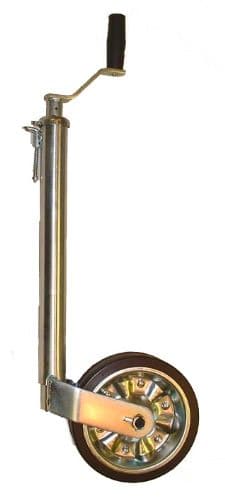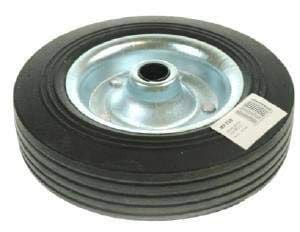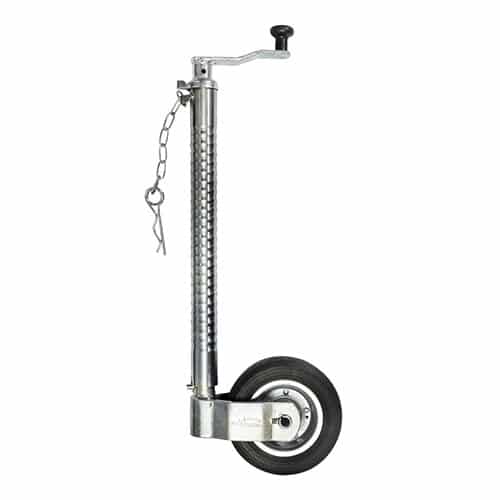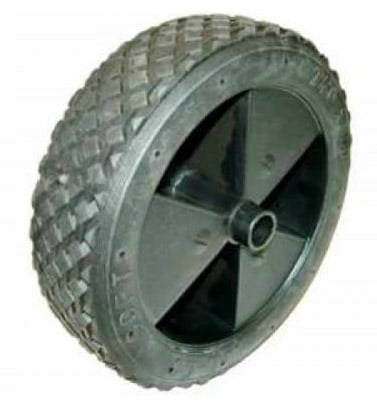There’s a lot of things to learn about if you are completely new to caravanning, and we hope we have covered a lot of the most essential things here at Caravan Helper. However, one thing we haven’t covered yet that we think is right up there with the most important things related to caravanning and more specifically towing and parking is jockey wheels.
Most caravans come with one already fitted to the drawbar or A-frame. However, over time it may not be as effective at its job and you may want to replace or you may just want to replace it to buy a better one. That’s when a lot of caravanners have difficulty. There are so many out there that it can be difficult to know what is a good one and one is the right one for you.
To help avoid a lot of stress and headaches then, we have put together this caravan jockey wheel replacement guide that you can use as a reference when the time comes and you want to buy a new one.
Table of Contents
Best Caravan Jockey Wheel Replacement
Now that we’ve covered a lot of the basics, let’s dive in and look at the jockey wheels we highlighted as being the best of the bunch that are available to buy at the moment.
We are back with Maypole for the third item on our list. This particular jockey wheel replacement does not come with a clamp. So that’s important to note. If you need a replacement clamp and jockey wheel you need to look elsewhere. However, it is more or less the same as the other Maypole item. With a 200mm steel wheel. However, this is designed to handle a slightly heavier nose weight, as it can cope with up to but not over 500kg.
Our next great product is just for the jockey wheel on its own and does not come with a spindle or clamp. It is a 200mm wheel with a width of 50mm and is made from strong and durable steel and features a rubber tyre.
With a 200mm pneumatic tyre and a 48 by 52.5mm diameter and length tube this jockey wheel comes connected to a spindle and is capable of handling a nose weight load of up to but not more than 350kg.
Again, this is not a complete spindle and wheel, but just the wheel itself and tyre. It’s made by Al-ko, who is a highly reputable brand of jockey wheels and worth considering if it is just the wheel itself you are looking to replace.
Well, we’ve reached the end of our list. We hope it has been a helpful guide to jockey wheels that help you understand their importance, what to look for when buying a new one or replacement. Hopefully, you will find a suitable one from those we highlighted above.
It can be confusing at first, but if you just keep in mind the basics, as is the case with anything related to caravanning, and don’t just rush out and buy the first you come across, we are sure you will be fine.
What Is A Jockey Wheel?
A jockey wheel is usually found at the front of your caravan close to the hitch, or A-frame, it is there for manoeuvring your tourer around when it’s not connected to your towing vehicle. It can be particularly helpful when you are hitching and unhitching your caravan from the towing vehicle because it means with the former that your car doesn’t need to be precisely positioned to help attach the hitch to the ball.
Why It’s Important to Choose a Good Quality Jockey Wheel
As jockey wheels have to be able to cope with nose weights that range from 75kg to 95kg, it makes sense that care should be taken when you are buying a replacement. As a general rule of thumb, it is wise to choose a wider and larger one rather than a model that is narrower. If the jockey wheel digs in too much it can put a lot of strain on you and the rest of the caravan outfit.
What to Look for in Jockey Wheels
As noted earlier, it can be hard for a newcomer to know what is a good or bad jockey wheel. There are many differences between on and the other, which is why we are going to discuss the main ones here and what you really should look out for.
Although different jockey wheels have different heights and some have inflatable tyres while others have solid rubber ones, the biggest and most important difference is actually in how they work.
A fixed or standard jockey wheel is normally bolted or welded onto the drawbar and can have pneumatic or solid wheels. The height is adjusted by undoing a level and pushing the shaft upwards or pulling it downwards to the required position. This is generally the choice for most average leisure and domestic applications.
A jockey wheel with a swivel bracket is designed to make it easier to use. You don’t even have to remove the jockey wheel from the trailer at all, you can just pull a special release handle and it rotates itself into the best position for travelling.
While an adjustable swivel bracket jockey wheel provides you with the option of swivelling it or removing it, as well as adjusting the height.
Which is Right for You?
Choosing the right one for your caravan outfit is dependent on a number of different things. You should check the load capacity is suitable for your caravan and ensure that it is made by a reliable and reputable manufacturer. Try speaking to other caravan owners, if you get the chance, to see how easy a particular jockey wheel is and which they prefer, being sure to also ask how easy they are to manoeuvre, adjust and remove.
FAQ
Are there jockey wheel clamps?
Yep, and these should be considered an essential part of your overall caravan security.
Should you carry a spare wheel jockey wheel?
They are only small, and we think if you have the room you should put one in your car boot when travelling.
Will a nose weight gauge fit on most wheel jockeys?
Yes, there should be no issues as most are universal.
Can you get puncture-proof tyres?
Yes, you can get plastic tyres.
Are wheel jockeys a thing for motorhomes?
No, they are not.
Top Tips
Regardless of the actual jockey wheel replacement you choose, you should avoid placing excessive weight onto it and try to use it, if possible, when the caravan is empty or has its lightest load. Jockey wheels, even the best, are not designed for bearing heavy loads.
When parking, it can be helpful to use a board underneath the jockey wheel to help it distribute the load better and prevent it from sinking into the ground too much which could cause damage to the wheel or the jack.
We also recommend getting a rubber wheel and not a plastic wheel.



